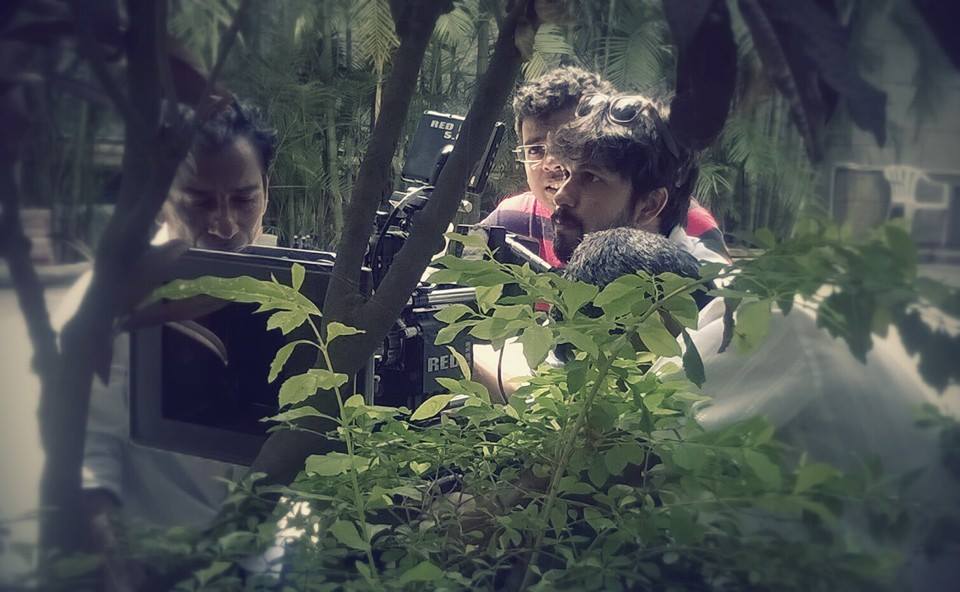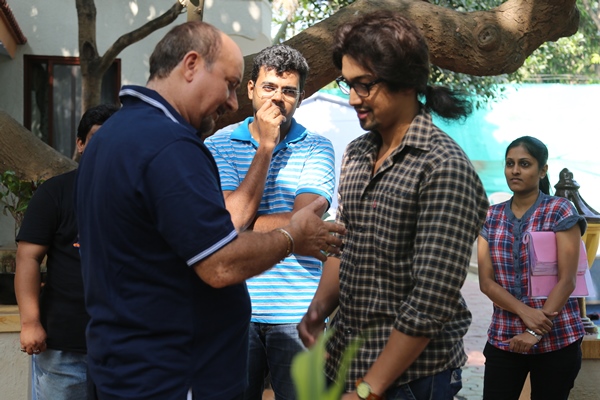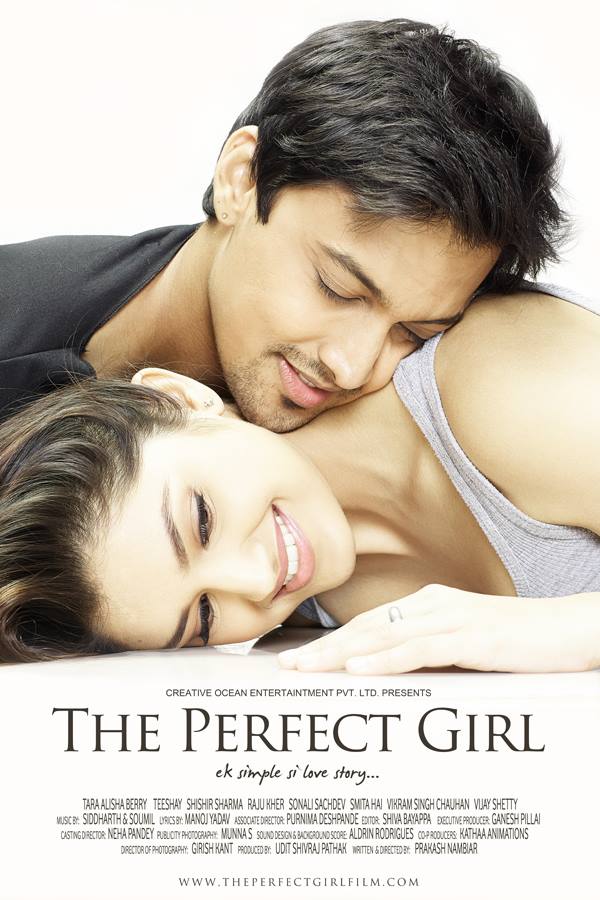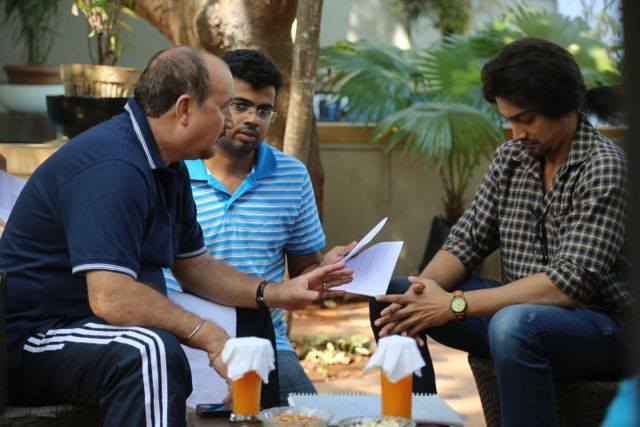Indie director Prakash Nambiar on his first feature length film – The Perfect Girl – and his entry into the juggernaut Bollywood film industry. “I’m a qualified architect”, says Nambiar, “but after practising for few months as a junior architect, I took the plunge into animation and later founded Kathaa Animations, the studio behind Hum Tum, a 2004 animated film starring Saif Ali Khan, Rani Mukerji and Rishi Kapoor ”. A decade later, Nambiar wrote and directed The Perfect Girl, a love story set in Goa. In this exclusive interview, resident film critic Lloyd Bayer goes behind the scenes for a tête-à-tête with debutant Bollywood director Prakash Nambiar.
 Cinematographer Girish Kant with director Prakash Nambiar – Courtesy Creative Ocean Entertainment PVT.LTD.
Cinematographer Girish Kant with director Prakash Nambiar – Courtesy Creative Ocean Entertainment PVT.LTD.
Lloyd Bayer (LB): Coming from an animation production background, at what point did it hit you that you wanted to make a live action film?
Prakash Nambiar (PN): When I ventured into animation, it was the creative aspect of animation that inspired me. Over the years and as the studio grew, my work started to focus on admin, marketing and finance. That probably was the first pain point. In 2005 – 2006, the animation space exploded with numerous studios and animation became a bubble, much like the dot com bubble in the late 90’s. There were many new players backed by huge investors, but on the field there were limited quality animators. The demand for good animators increased and they started demanding higher salaries from one studio to another. But the fresh recruits from various animation institutes where not trained enough to deliver quality on par with international standards. As a result, the entire business model for the animation industry started crumbling and studios started defaulting on their delivery commitment. It was at this time that the Lehman brothers went bankrupt and then everything went into a spiral. At this point, I was not enjoying what I had begun doing, and thus decided to close the studio. I went into a sabbatical. A year later, I happened to visit a friend’s film set. It was here that I looked into the eye piece of the ARRI 435 camera and I felt goosebumps. This was when I realised that filmmaking is what I want to do for the rest of my life.
LB: Excellent! It’s always exciting to see new talent emerging in the film industry. What was your inspiration behind this film and how did you materialize your vision?
PN: The inspiration behind the film started with the architecture of Goa. In 2006, when I was going through a tough time with my company, I happened to visit a friend who was then based in Panjim. One afternoon, I was out and about and realised it was so beautiful. The architecture was so striking that I wondered how I missed out on it. No film had ever captured the architectural essence of Goa. All Goa is known for are the beaches and trance parties. An idea was already germinating. A couple of days later, I happened to meet a 65 year old Australian woman in a restaurant and we started talking. We clicked so well, we did not realise how time flew. We parted ways and it was later that I realised we hadn’t exchanged names. This generated a stream of thoughts. What if two people fell in love when they met briefly, just for an hour? What would make them fall in love? And what if they cross each other many years later, but their memories are so distant they do not recognise each other.
LB: Fascinating idea. Which leads me to ask, since this is an independent production, what were your initial challenges and how did you overcome these challenges?
PN: The challenges are still coming even as we are closing in on the release. Being an independent production, you don’t have the fancy budgets studios have. Right from the start we had to be very frugal with our expenses. So much so, that on our recce, we actually slept in tents by the beach. We had a water tight pre-production and executed it in 18 days, which were still 3 days over what we had envisaged. Even while releasing the film, we are thrifty with our expenditure. Our belief is that the content is what will drive the film ahead. Whatever we can do within our limitations we shall do. The rest we leave to the audience. They shall reward us or punish us!
 Director Prakash Nambiar, observing his scene setup – Courtesy Creative Ocean Entertainment PVT.LTD.
Director Prakash Nambiar, observing his scene setup – Courtesy Creative Ocean Entertainment PVT.LTD.
LB: I understand that you also wrote the script. Is it an original story or an adapted screenplay?
PN: I have always felt that creation is never original. It is an amalgamation of thoughts and ideas accumulated over the years. Maybe the books I read, the films I see, the emotions that I experienced or emotions my friends experienced, their heartbreaks, their turmoil, my turmoil… It’s all about channelizing these experiences and ideas into a concept.
LB: In brief, what is the film about?
PN: The film is about a couple who meet in Goa. They have an hour to themselves before the bus arrives and they begin to have a conversation. By the end of an hour, they realise they are perfect for each other. Unfortunately, they part ways. Many years later they cross each other’s paths. The boy sees her and wonders where he has seen her, and by the time he realises it was the girl he met many years ago in Goa, she has disappeared into the crowd.
LB: Sounds like a Richard Linklater film. By Bollywood standards, how different is The Perfect Girl from other romance films?
PN: [Laughs] I wouldn’t know how to define different. I have tried to keep the film as close to reality as possible. Is that different enough?
LB: Fair enough. What demographic of the audience is this film aimed at?
PN: Primarily, I believe it would attract the age group between 15 and 34.
LB: What’s it like being the director of a film? How did reality meet your vision?
PN: It’s crazy. Before I ventured into films, I always thought he [the director] just sat and directed the shots. But with this film I realised you have to do many things. The biggest thing is to take the entire unit together in one direction. Framing a shot and getting the performances right are nothing compared to keeping the unit motivated, especially when shooting on a shoestring budget. You know you cannot provide them with the facilities they are used to in a studio backed film, but you have to go that extra mile to make them believe in the vision and keep them smiling even through tough conditions. You should know how to trust your people; you should know when to get them on track. Direction, for me, is to make everyone in the team look in one direction, and allow them to explore their creativity. That’s when reality meets your vision.
LB: Speaking of which, what can you tell us about your lead actors and the decision to cast them in this film?
PN: Tara Alisha and Teeshay are both very hardworking actors. Both of them are very different in their styles. Their approach to their characters in the film is very different from each other. When I was casting, I knew I wanted relatable characters; characters who are very next door people. I always thought casting the girl would be a problem, but Tara’s audition was so bang on, I knew she would fit into her character very well. Finding the male lead was the most difficult part. We had done all the shot divisions and the date to shoot was approaching the deadline. We couldn’t delay the shoot as we were already in the far end of May with monsoons in Goa expected by the first week of June. I think it was just around a week before the schedule date that we zeroed in on Teeshay. To be honest, I was always apprehensive about their pairing, but when we shot the first scene, and I looked into the monitor, I knew the casting was bang on.

LB: Would you consider acting in your own film?
PN: No [smiles]
LB: What are your aspirations for the future? Any projects in the pipeline?
PN: There are many projects I have in mind, but that’s for later. First let me see this film through its last phase.
LB: Now that you have your first film releasing shortly, what advise do you have for aspiring filmmakers?
PN: Firstly, film making is not for normal people. You have to be mad in some sense, because it is only insanity that will get you through the tough times. By insanity, I mean that you have to be mad enough to believe in yourself and your dreams. There will be many obstacles, but you have to overcome them in your own style. Do have a vision, but play by the day. Have an alternate source of income, because filmmaking is only emotionally rewarding as the monies that you might be dreaming off may never happen. Be a filmmaker because you love films, not the glamour or the razzmatazz of the industry. It may be the biggest stars that we adore, but behind the silky makeup is a lot of unseen pain, hard work and insecurity.
LB: Being your first film release I’m sure you must have an endless list of names that helped you assemble this project. Is there anyone in particular you wish to thank?
PN: Besides my partners in the film, Udit – my producer and Girish – my cinematographer, there is one person without which this was not possible and that is The Perfect Girl in my life – my wife.
 Rehearsals with Anupam Kher and Teeshay. Courtesy Creative Ocean Entertainment PVT. LTD.
Rehearsals with Anupam Kher and Teeshay. Courtesy Creative Ocean Entertainment PVT. LTD.
LB: Finally, if you could start one rumour about yourself, what would it be?
PN: That I am in the race for an Oscar!
LB: It’s been a pleasure meeting you Prakash. On behalf of Filmphoria, we wish you all the very best for the release of your first film, and here’s to a long and successful career in filmmaking.
PN: Thanks Lloyd, it was such a pleasure talking to you!
The Perfect Girl ek simple si love story is scheduled to be released in India and the U.A.E. on September 11.